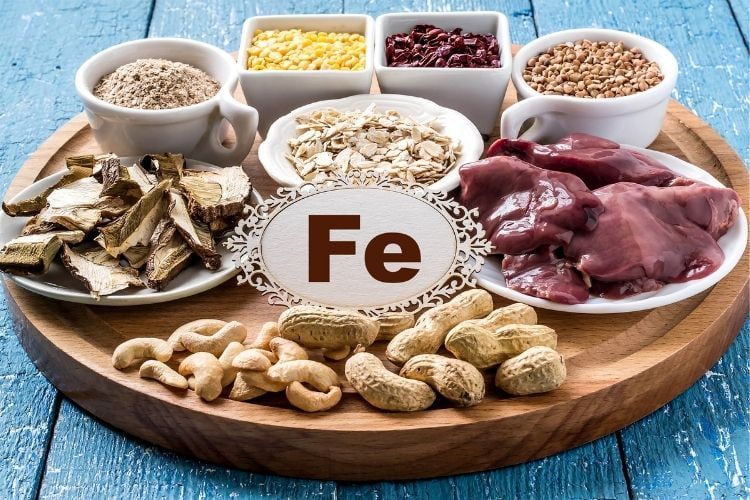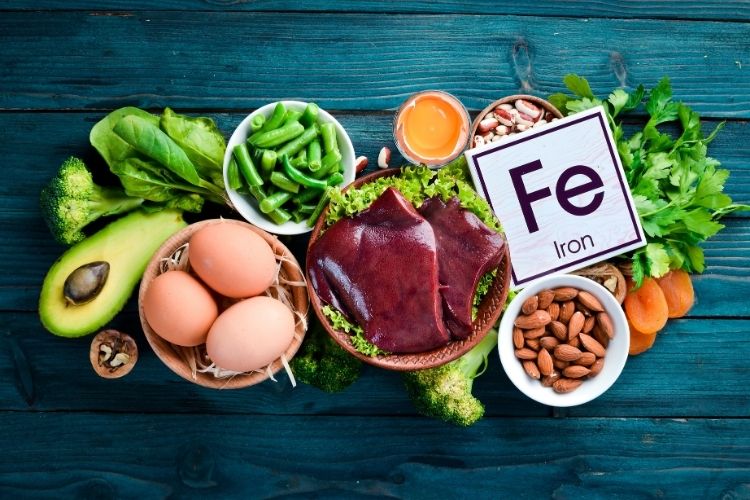A healthy human body needs certain vitamins and minerals. Iron is also one of these minerals. It is very important to supplement this mineral, which the body cannot produce on its own, from the outside. So, what is iron and why is it important? What changes occur in the body in case of deficiency? If you are ready, let’s take a closer look at the answers to all these questions.
What Is Iron?
Iron is one of the most commonly found chemical elements on Earth. In addition to its physical usability, it is an important mineral present in the body. The importance of this mineral, which cannot be produced by the body itself, is quite significant. The most well-known function of iron is to support the production of hemoglobin. Hemoglobin is found in red blood cells and is responsible for transporting oxygen throughout the body. Maintaining optimal iron levels is crucial for a healthy circulatory system. Keeping iron levels appropriate is a necessity for bodily functions.

What Is Iron?
What is Iron Deficiency?
Iron deficiency is a condition that directly affects all body systems. It can lead to a series of health problems and is quite common. Iron is used in the body for energy production and supports oxygen circulation. It also plays a crucial role in strengthening the immune system. To the question “What is iron deficiency?”, the answer can be given as the insufficient presence of iron mineral in the body to support vital functions.
After understanding the concept of iron deficiency, it is important to look closely at what causes this condition. The factors that can lead to iron deficiency include:
- Inadequate and unbalanced nutrition
- Conditions causing blood loss
- Pregnancy
- Menstrual cycle
- Bleeding within the digestive system
- Uninformed use of over-the-counter medications
- Various types of cancer
- Celiac disease
- Genetic factors
If you have risk factors that could lead to iron deficiency, you can measure your levels periodically through blood tests based on your doctor’s advice. According to the results, you may need to change your diet or use supplements.

What Is Iron?
It is also useful to be aware of the symptoms of iron deficiency. If you experience any of the following symptoms, you may need to consult your doctor
Symptoms of Iron Deficiency
It is beneficial to be aware of the symptoms of iron deficiency. If you experience any of the following symptoms, you should consult your doctor:
- Excessive fatigue
- Persistent sleepiness
- Changes in skin color
- Feeling of coldness in the hands and feet
- Frequent heart palpitations
- Dizziness
- Excessive hair loss
- Disrupted sleep patterns
- Excessive or reduced appetite
- Difficulty concentrating
- Ringing in the ears
- Weakening of nails
- Bruising in various parts of the body
- Tendency towards depression
- Restless leg syndrome
All symptoms should be evaluated as a whole, and a diagnosis should be made after blood tests. It is important to get a professional opinion for a correct diagnosis and appropriate treatment plan.
What Can Iron Deficiency Lead To?
f the iron mineral is present in your body in less than the expected amount, you may experience various issues. The biggest impact of iron deficiency is the inhibition of red blood cell production. This also disrupts the transport of oxygen to organs and muscles, leading to fatigue. You may suddenly feel tired and exhausted while running or walking, and may also experience moments where you cannot control your breathing. Dizziness and balance issues can also occur, negatively affecting your daily life quality. If you suspect iron deficiency, it is recommended to consult your doctor without delay. With the right diagnosis and treatment plan, along with dietary adjustments, you can regain your health.
How to Address Iron Deficiency?
Iron deficiency can lead to various health problems, but overcoming it is not very difficult. Consuming iron-rich foods and adopting a balanced and regular diet are among the best steps to take to address this deficiency. You may wonder, “Which foods contain iron?” Various protein sources and some vegetables are high in iron.
In cases where diet alone is insufficient, supplements can be used. You can consume iron supplements or multivitamin products containing iron. If you are experiencing iron deficiency due to a medical reason, you should regularly use the medications prescribed by your doctor. It is very important to support medication with the right diet. It is recommended to be aware of which food groups should not be consumed with iron supplements. For example, you should avoid consuming your supplement with dairy products, as they delay the absorption of this mineral. To achieve maximum benefit, increasing vitamin C intake may also be recommended. Additionally, reviewing some of your habits can be helpful. Excessive caffeine consumption can play a role in iron deficiency. Reducing tea and coffee intake can help you overcome this issue. Drinking plenty of water can support reducing caffeine cravings.
Diet for Those with Iron Deficiency
People with iron deficiency are expected to pay attention to their dietary patterns. The benefits of supplements may not meet expectations if you do not eat properly and adequately. If you have iron deficiency, you should pay attention to the following:
- Do not neglect to include foods rich in vitamin C in your meals.
- If you have severe iron deficiency, limit your calcium intake.
- Do not overcook meat products and legumes.
- Keep fiber intake to a limited amount, as fiber can reduce iron absorption.
- Consume tea and coffee as little as possible and not with meals.
- Add green leafy vegetables to every meal.
- Pay attention to consuming eggs.
- Include dried fruits and nuts in your snacks.
One of the most effective ways to combat iron deficiency anemia is through proper nutrition. When you regulate your diet, you will see that problems related to iron deficiency gradually decrease.
Which Foods Contain Iron?
Iron from food comes in two different forms: heme and non-heme iron. Heme iron is found in animal-based foods. Non-heme iron is plant-based. Vegetables and grains are rich in non-heme iron. Here are some foods that contain iron:
- Fish
- Red meat
- Chicken
- Eggs
- Shellfish
- All legumes, especially lentils
- Broccoli
- Spinach and other green leafy vegetables
- Nuts such as almonds, walnuts, hazelnuts, and peanuts
- Dried apricots, raisins, and dried figs

What Is Iron?
The mentioned food products are quite rich in iron. For a balanced diet, it is important to include these foods in your meals. By diversifying your diet instead of following a single type of eating pattern, you can minimize the risk of iron deficiency and related anemia. Sometimes, consuming these products alone may not be sufficient. Some supportive foods are also needed, and the consumption of others should be reduced. For example, to enhance iron absorption, it can be beneficial to consume a product rich in vitamin C alongside meat dishes. You can add supportive foods like a salad with plenty of lemon to your meals.
Calcium is a mineral that reduces iron absorption. If you are going to eat foods high in iron or take a supplement, it is recommended to consume foods high in calcium after a certain time interval. For the best guidance, you can seek advice from a nutritionist.
Iron-Rich Pumpkin Seeds
Pumpkin seeds are a very healthy snack and can be easily enjoyed as a mid-meal option. These seeds are also extremely rich in iron. A 28-gram serving contains 2.5 mg of iron, which accounts for 14% of the daily requirement.
Legumes: A Staple on the Table
Legumes are a staple on the table due to their satiety and health benefits. Rich in iron, these products can be consumed as main dishes, salads, appetizers, and snacks. Their fibrous structure is known to contribute to strengthening the digestive and immune systems. One serving of legumes contains 4% iron. Their high iron content is a great advantage for those following a vegetarian diet.
Nutritious Nuts
Fatty foods and seeds, such as walnuts, almonds and hazelnuts, are foods that should definitely be included in a balanced diet. These foods, which are rich in magnesium and potassium, also have a very high iron content. A handful of almonds is about 28 grams and contains 1 mg of iron. Besides, kiwi can provide iron benefits when consumed together with fruits containing vitamin C, such as tangerines.
Daily Iron Requirement
Questions like “How to address iron deficiency, which foods contain this mineral?” or “What is the daily iron requirement?” are common among those aiming for a healthy lifestyle. The amount of iron expected in a healthy body can vary depending on several factors.
To avoid iron deficiency and replenish the body’s stores, it’s essential to know the daily iron intake requirements. The daily iron requirement for an adult woman is approximately 18 mg. Women who are pregnant or breastfeeding need more iron. For a pregnant woman, the daily iron requirement increases to 27 mg. For men, this amount is 8 mg. During pregnancy, your doctor may monitor your iron levels during routine check-ups, and you might need to take various supplements. Following your doctor’s advice is crucial for both your health and your baby’s health.
One of the main causes of iron deficiency in men is known to be hidden bleeding in the digestive system.
Why Is Iron Important for Athletes?
Iron intake is also crucial for athletes. Athletes need to pay attention to their iron intake to enhance both their quality of life and performance. The amount of oxygen circulating in the body directly affects performance during sports activities. Iron is the most important mineral influencing this oxygen circulation. Therefore, if you exercise regularly, you should strive to maintain your iron levels at an optimal level.
Consuming Iron-Rich Foods: Essential for Athletes
Consuming iron-rich foods is the easiest and most effective method for athletes to meet their iron needs. Post-workout consumption of animal proteins can help fulfill your iron requirements. Additionally, consuming plenty of greens and lemon can be beneficial. Grains and high-fat nuts are indispensable in athlete diets. These iron-rich foods also support fat burning and muscle development.
If you are undergoing intense training or have an iron deficiency problem, you may need to use iron supplements. It is crucial for those involved in sports to consume such supplements consciously. You can get supplement recommendations from your doctor and create an iron-rich diet plan with the support of dietitians specializing in sports nutrition. This way, you can protect your muscle health and find a way to maintain high overall performance.
Iron deficiency can bring about additional health issues and negatively impact your daily life quality. If you are especially active in sports, you need to ensure that your iron levels are at appropriate levels. Do not forget to take iron supplements, maintain a sufficient and balanced diet, and keep up with your exercise routine.


